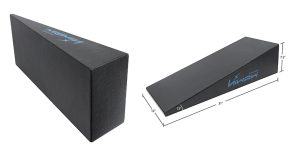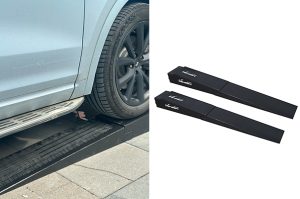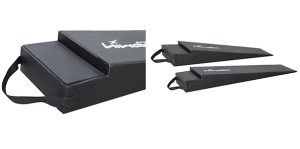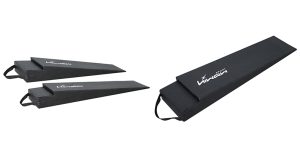Operating trailers in coastal environments presents unique challenges. High humidity, salt spray, and airborne chlorides can significantly accelerate corrosion, leading to reduced load capacity, safety risks, and shortened equipment lifespan. For vehicle owners, fleet operators, and marine-related industries, standard trailer ramps often fail prematurely under these harsh conditions.
Why Coastal Environments Accelerate Corrosion
Coastal regions combine several factors that intensify corrosion:
- Salt-laden air that deposits chlorides on metal surfaces
- High humidity that sustains electrochemical corrosion processes
- Frequent temperature cycling causing microcracks in coatings
- Occasional seawater contact during boat launching or shoreline operations
These conditions can quickly degrade untreated steel ramps, leading to rust, weakened welds, and compromised safety.

Key Features of Corrosion-Resistant Trailer Ramps
1. Material Selection
The foundation of corrosion resistance lies in material choice:
-
- Aluminum alloy ramps
Naturally corrosion-resistant, lightweight, and ideal for frequent handling. Aluminum forms a protective oxide layer that resists salt-induced rust.
-
- Galvanized steel ramps
Zinc-coated steel provides sacrificial protection, significantly slowing corrosion in salt-air environments.
-
- Stainless steel components
Often used in pins, fasteners, and hinges to prevent localized corrosion at critical connection points.
2. Protective Surface Treatments
Advanced surface treatments further enhance durability:
- Hot-dip galvanization for long-term outdoor exposure
- Marine-grade powder coatings with enhanced adhesion and salt-spray resistance
- Anodized aluminum finishes for added protection and wear resistance
High-quality coatings are essential for preventing corrosion initiation at edges, welds, and high-wear areas.
3. Structural Design for Drainage and Ventilation
Well-designed trailer ramps minimize moisture retention by:
- Incorporating open-grid or perforated surfaces
- Avoiding enclosed sections where saltwater can accumulate
- Using smooth weld transitions to reduce corrosion-prone crevices
Good drainage not only reduces corrosion but also improves traction during wet conditions.
Typical Coastal Applications
- Boat trailers and marine transport
- Car haulers in coastal cities
- Rental fleets near beaches and ports
- Landscaping and construction trailers in humid regions
- Emergency and recovery vehicles operating near shorelines
In these applications, corrosion-resistant ramps reduce downtime and long-term maintenance costs.
Safety Benefits in Corrosive Environments
Corrosion is not just a cosmetic issue—it directly affects safety. Corrosion-resistant trailer ramps help ensure:
- Consistent load-bearing capacity
- Secure traction surfaces free from flaking rust
- Reliable hinges, locking pins, and mounting points
- Reduced risk of sudden structural failure
For coastal operations, corrosion resistance is a critical safety requirement, not an optional upgrade.
Maintenance Best Practices for Coastal Use
Even corrosion-resistant ramps benefit from proper care:
- Rinse ramps with fresh water after salt exposure
- Inspect welds, fasteners, and coatings regularly
- Touch up damaged coatings promptly
- Store ramps in covered or ventilated areas when possible
Routine maintenance can significantly extend the service life of ramps used in coastal environments.
How to Choose the Right Corrosion-Resistant Trailer Ramp
When selecting a trailer ramp for coastal use, consider:
- Material type (aluminum vs galvanized vs stainless components)
- Load rating with safety margin
- Surface traction design for wet and sandy conditions
- Certification or testing for salt spray and corrosion resistance
- Total cost of ownership, not just initial price
Investing in corrosion-resistant designs often results in lower long-term costs and improved reliability.
Coastal environments demand more from loading equipment. Corrosion-resistant trailer ramps provide the durability, safety, and reliability needed to withstand salt air, humidity, and harsh outdoor conditions. Through the right combination of materials, coatings, and structural design, these ramps deliver long-term performance where standard ramps fall short.







